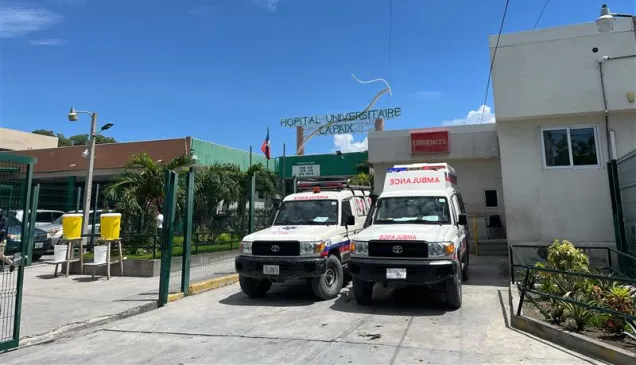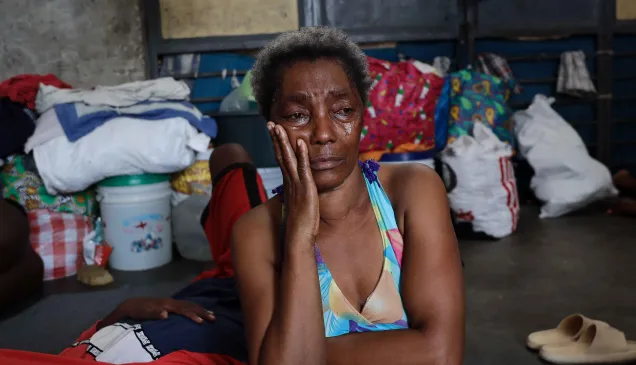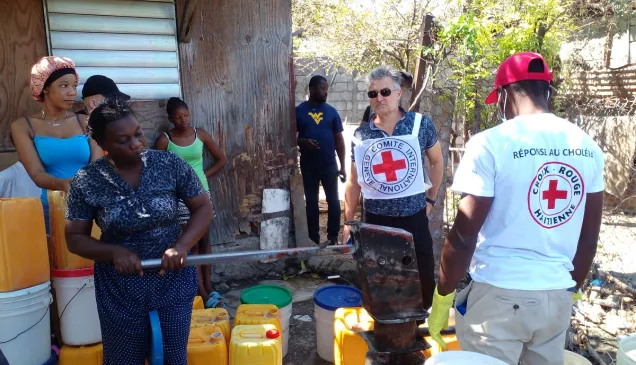Haiti: Delivering health care amid growing insecurity
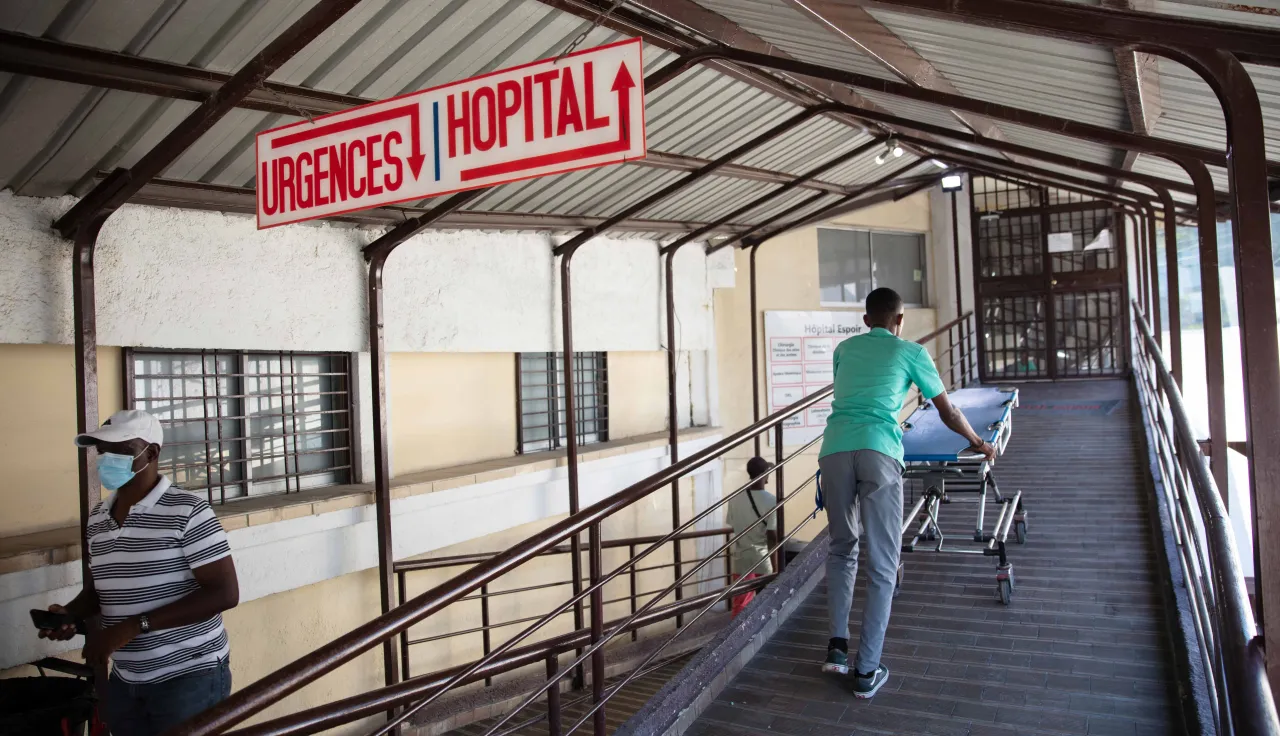
Roadblocks and check points. Very few ambulances and some unequipped. Frequent threats and acts of aggression towards healthcare workers and facilities. Closure of health structures. Life-threatening wounds and limited medical staff. This is what medical personnel and volunteers of the Haitian Red Cross ambulance service face on daily basis when trying to provide assistance in the streets of Port-au-Prince.
"For the past three years, life at Cité Soleil has been like a poker game most of the time. People go out and don't know if they will be able to go back home. They regularly risk their lives to get the daily bread for their families," said Father David, who has lived in Brooklyn, one of the areas in Cité Soleil heavily affected by armed violence, for years.
He has seen it all. "I've witnessed many gunshot wounds during recent clashes," he said. "In fact, people from the community bring many of the wounded to my home, so that I help evacuate them. I've seen a lot of people die in the dispensary from bullets to the head."
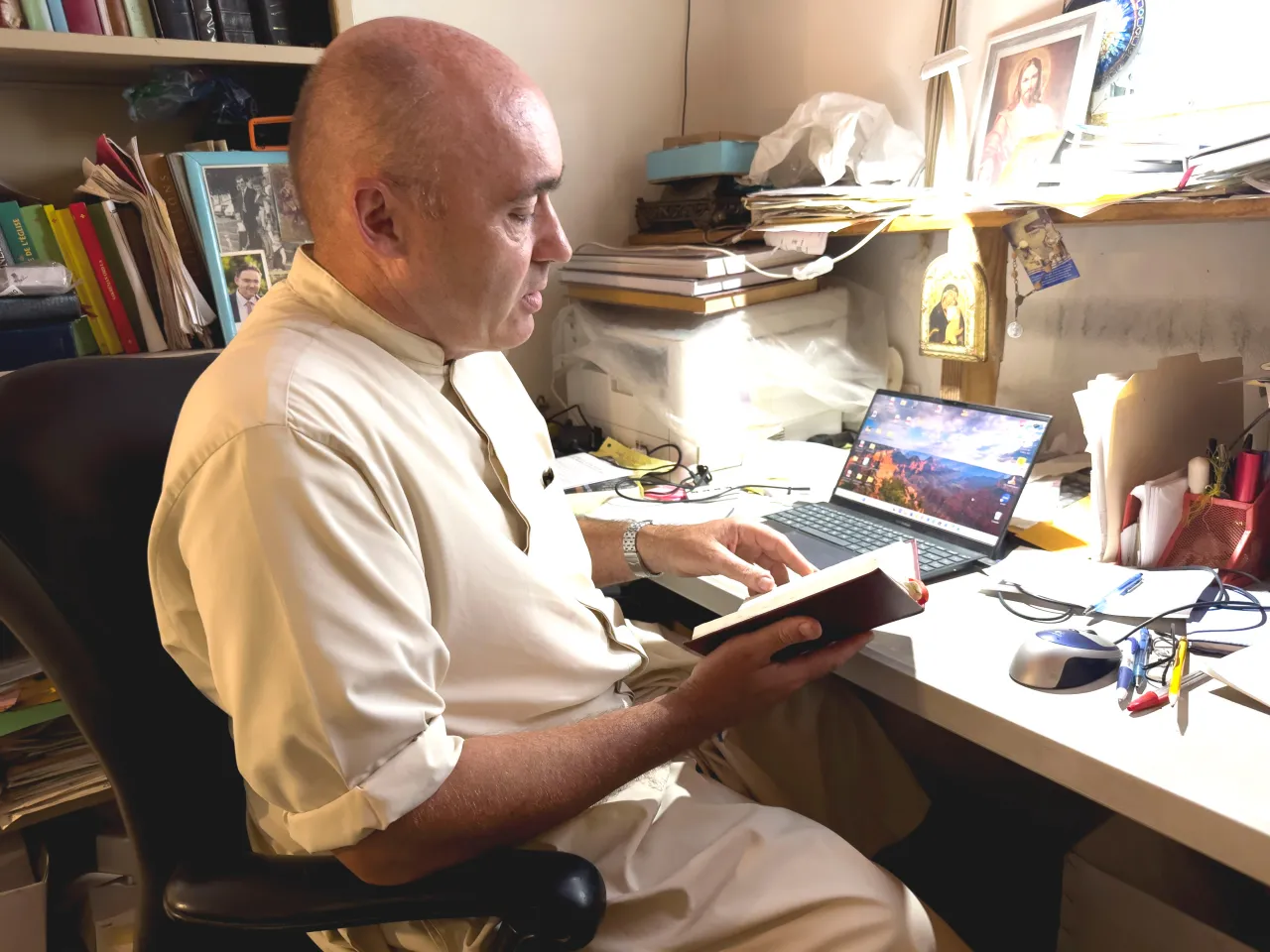
Father David at his chapel in Brooklyn, one of the areas in the neighborood of Cité-Soleil, heavily affected by armed violence.
The humanitarian situation in Haiti has dramatically deteriorated in the recent years. Intensifying clashes among armed groups or between armed groups and the National Police of Haiti, have resulted in increased levels of humanitarian consequences for communities already suffering an acute economic crisis, with inflation going beyond 48% and nine out of ten Haitians living below the poverty line.
People living in areas severely affected by armed violence have seen their movements in and out of their neighborhoods getting more and more complicated.
However, when injured or sick, their only option to get treatment is travelling to a hospital, given that health services in these neighborhoods are barely existent and medical staff have stopped in many cases to work there due to insecurity.
"When there are shootings, we stabilize the wounded in the dispensary next to my chapel. And if there is a moment of calm, we try to get them out, or ambulances try to come, but it is always tricky and dangerous," said Father David. "I remember one time, as I was leaving Cité-Soleil to transport two injured people, someone shot at my car. Apparently, one armed group thought I was carrying soldiers from the opposing group."
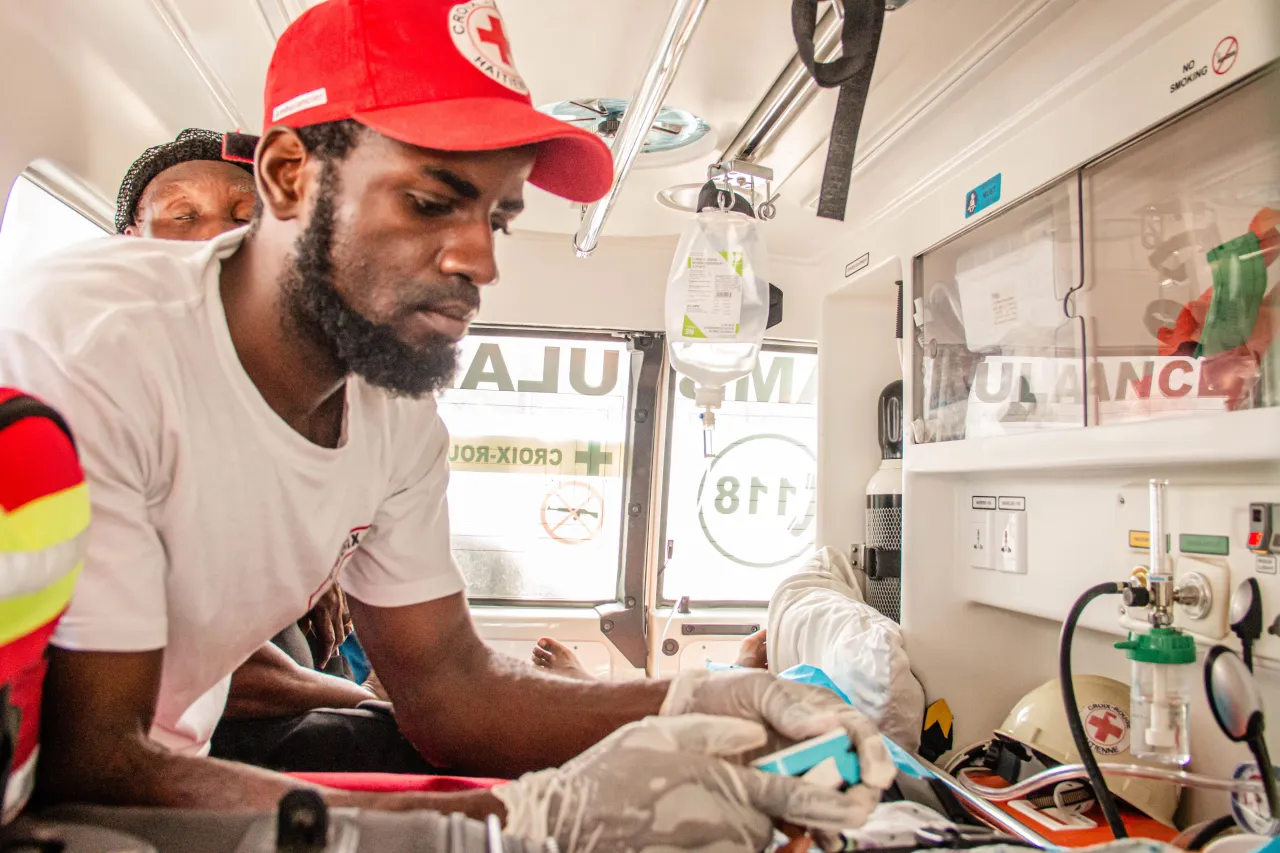
Doctor Jonathan Gilles has been a Red Cross volunteer for more than 8 years now.
Red Cross volunteers and staff are not immune to violence either. The growing insecurity has forced the Haitian Red Cross (HRC) to limit its ambulance services to certain areas of Port-au-Prince. "In addition, the ambulance service faces the lack of financial, material, and human resources to maintain minimal operations in Port-au-Prince and in at least four of the country's major cities: Cap-Haitien, Cayes, Jérémie and Gonaïve", stressed the President of the HRC, Güetson Lamour.
Red Cross teams trying to deliver healthcare in such a volatile and insecure environment rely purely on acceptance and respect from all armed actors in order to access these areas and suffer a high level of distress when carrying out their work.
"I will always remember a trip to get a patient who had been shot in the head to get a CT scan of the skull. She was conscious and under a lot of stress. All along the way we had not only to monitor her status but also comfort her", said Dr. Gilles, who works for the Haitian Red Cross ambulance service. "As soon as we go to these communities, we make sure that the Red Cross emblem is clearly visible "but I'm generally worried that something may happen."
In a coordinated effort with other Red Cross and Red Crescent Movement partners, the Norwegian Red Cross is training HRC volunteers to better deal with situations of armed violence in the context of their work. Kidnapping, road blockades, verbal, and armed aggression are some of the incidents they might face, stressed Derek Spranger, Operations Advisor of the Norwegian Red Cross. Together with the equipment that will be provided, in coordination with the ICRC in the next months, such as reinforced work boots, specialized helmets, or extra uniforms, among others, these trainings aim to help them mitigate those threats.
"Certainly, those volunteers make a difference every day they get out to assist people in need in the streets of Port-au-Prince," said Marisela Silva Chau, ICRC's Head of Regional Delegation for Panama and the Caribbean. "However, Haiti needs much more to tackle the suffering of people living in areas affected by armed violence: the international community needs to take firm and committed action to enable a coordinated humanitarian response to the needs of an extremely vulnerable population."
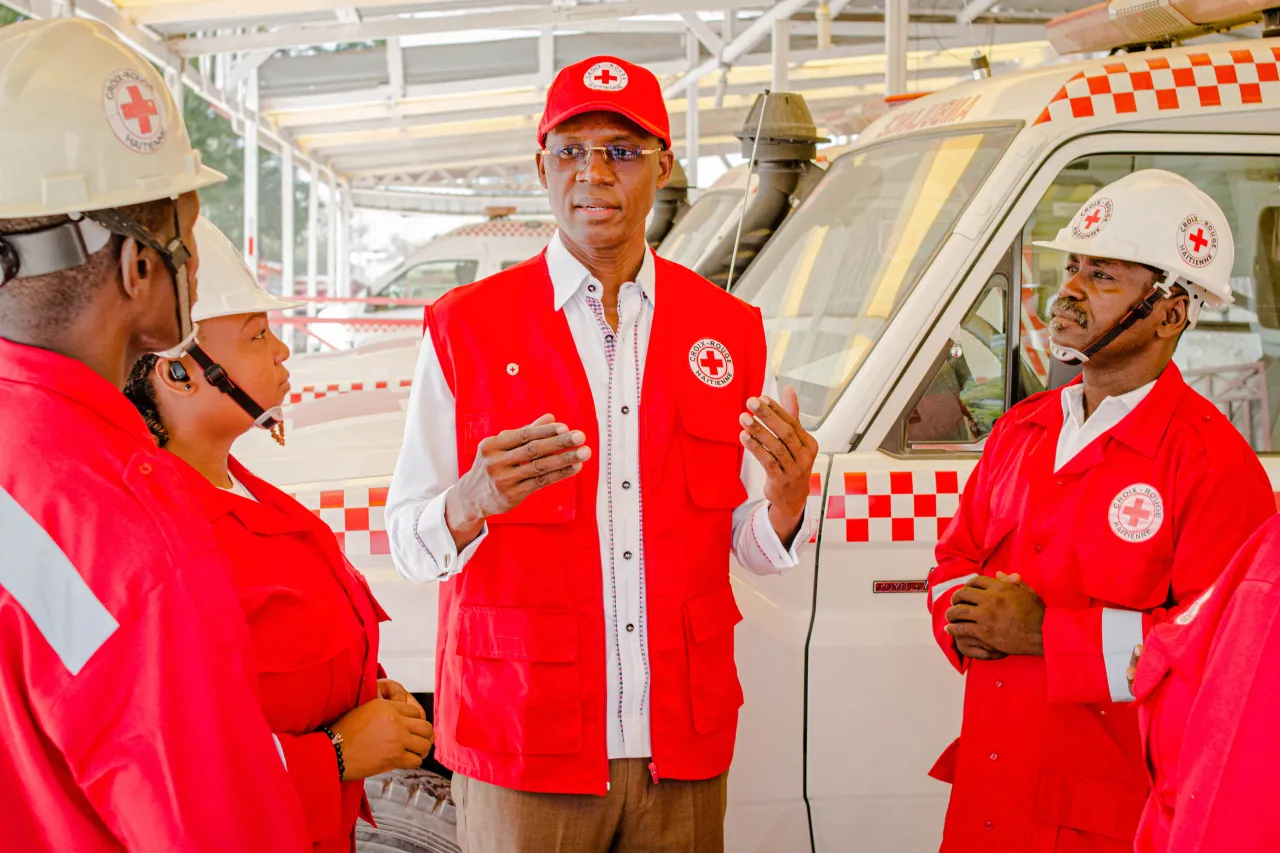
Haitian Red Cross president Guëtson Lamour (center).
What we do
In Haiti, the ICRC engages with communities affected by armed violence to facilitate their safe access to essential services, primarily emergency health care. We support first responders and hospital staff to help them provide timely, impartial, and effective life-saving care for victims of armed violence and other emergencies and seek to help communities build their own strategies to face the consequences of violence.
We dialogue with all armed actors to promote humanitarian principles and mitigate the risks faced by communities.
Some figures
- In 2023, we have provided weapon wounded surgical kits to 6 hospitals. Each kit allows medical staff to treat from 15 to 50 people, depending on the severity of the wounds.
- In two years (2022-2023), more than 290 people in Cité Soleil and Bas Delmas received a two-day first aid training and 255 first aid kits.
- We provided 3 hospitals with lockers for weapon carriers to store weapons before entering the premises and painted murals with "no weapons" signs.
- 45 medical and health support staff attended ICRC´s awareness sessions on how to de-escalate violent situations.
- More than 20 volunteers in the HRC have received ICRC's awareness sessions on safe behaviors to mitigate risks.
- In the aftermath of the cholera outbreak (September/October 2022), 1,700 households in Cité Soleil could mitigate the risks of cholera thanks to ICRC´s distribution of 5,000 soaps, 36,000 oral hydration salt, and 180,000 chlorine tablets distributed.
- Together with Health Through Walls (HTW), ICRC prevented and mitigated the spread of cholera in 18 detention centers in the country.
- Between November 2022 and June 2023, the HRC's ambulance service received around 572 calls and treated 516 people, including 44 with gunshot wounds, thanks to financial, material and technical support from the ICRC.

